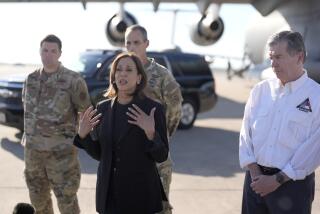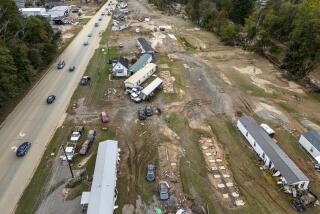Powell Surveys Relief Efforts on Ravaged Grenada
- Share via
POINT SALINES, Grenada — Secretary of State Colin L. Powell met with leaders of this hurricane-ravaged Caribbean island nation Wednesday, inspected relief efforts and pledged more U.S. support to help revive an economy that was decimated last month.
At least 39 people died Sept. 7 when Hurricane Ivan ripped across the island, causing damage estimated at more than $1 billion -- a figure twice the tiny country’s gross domestic product last year.
“We’ll do everything we can to help,” Powell told Prime Minister Keith Mitchell at an airport news conference.
Mitchell, who at one point appeared to be on the verge of tears, thanked Powell for the swift U.S. aid and even more for his personal visit.
The visit “has provided a moral lift to our people who have been extremely battered,” he said. “I have been lifted a lot, and I’m pretty sure you’ve lifted every single Grenadian.”
This week, President Bush asked Congress for an additional $50 million in disaster relief and reconstruction money for Caribbean countries that also include Jamaica and Haiti, which alone suffered more than 3,000 deaths from Tropical Storm Jeanne last month.
The requested amount was in addition to $63 million already earmarked for recovery aid to the region.
During his brief stop here at the end of a three-day trip to Brazil, Powell visited a food distribution center near the airport and talked with some of the hundreds of soldiers brought in from other Caribbean countries to maintain order and halt an outbreak of looting that followed the hurricane.
A month after taking a direct hit from Hurricane Ivan, the island’s 100,000 people are still reeling from its impact. The main agricultural crop, nutmeg, which officials said supported 8,000 families, was virtually wiped out. Many farmers wonder whether it’s possible to start again, given that replacement trees would take five to seven years to produce their first crop.
With an estimated 90% of hotel rooms no longer serviceable, the island’s biggest industry -- tourism -- has in effect ceased to function.
Even the cruise ships that put in to port here at a rate of three or four a week before the hurricane have stopped coming.
Major roads are clear, and water and electricity supplies are gradually being restored. But land-line telephone service, the island’s three television stations and several radio stations are still out of order. U.S. officials said the extent of the devastation was so great that many residents remained traumatized, unsure how to begin again.
“Clearly this country has been hit with a devastating tragedy that has affected its infrastructure, its means of income and hurt its people psychologically,” Powell said.
Government officials said that about 90% of the island’s homes were damaged. From the air, bright blue tarpaulin material could be seen protecting many buildings from the elements.
After talks with Mitchell and members of the Grenadian Cabinet, Powell said immediate aid priorities would focus on providing shelter for those still homeless and getting schools up and running again.
He said that would require tarpaulins for covering schools with damaged roofs, tents for teachers to live in, kitchen utensils so that students could be fed hot meals and new laboratory and computer equipment.
More to Read
Sign up for Essential California
The most important California stories and recommendations in your inbox every morning.
You may occasionally receive promotional content from the Los Angeles Times.













